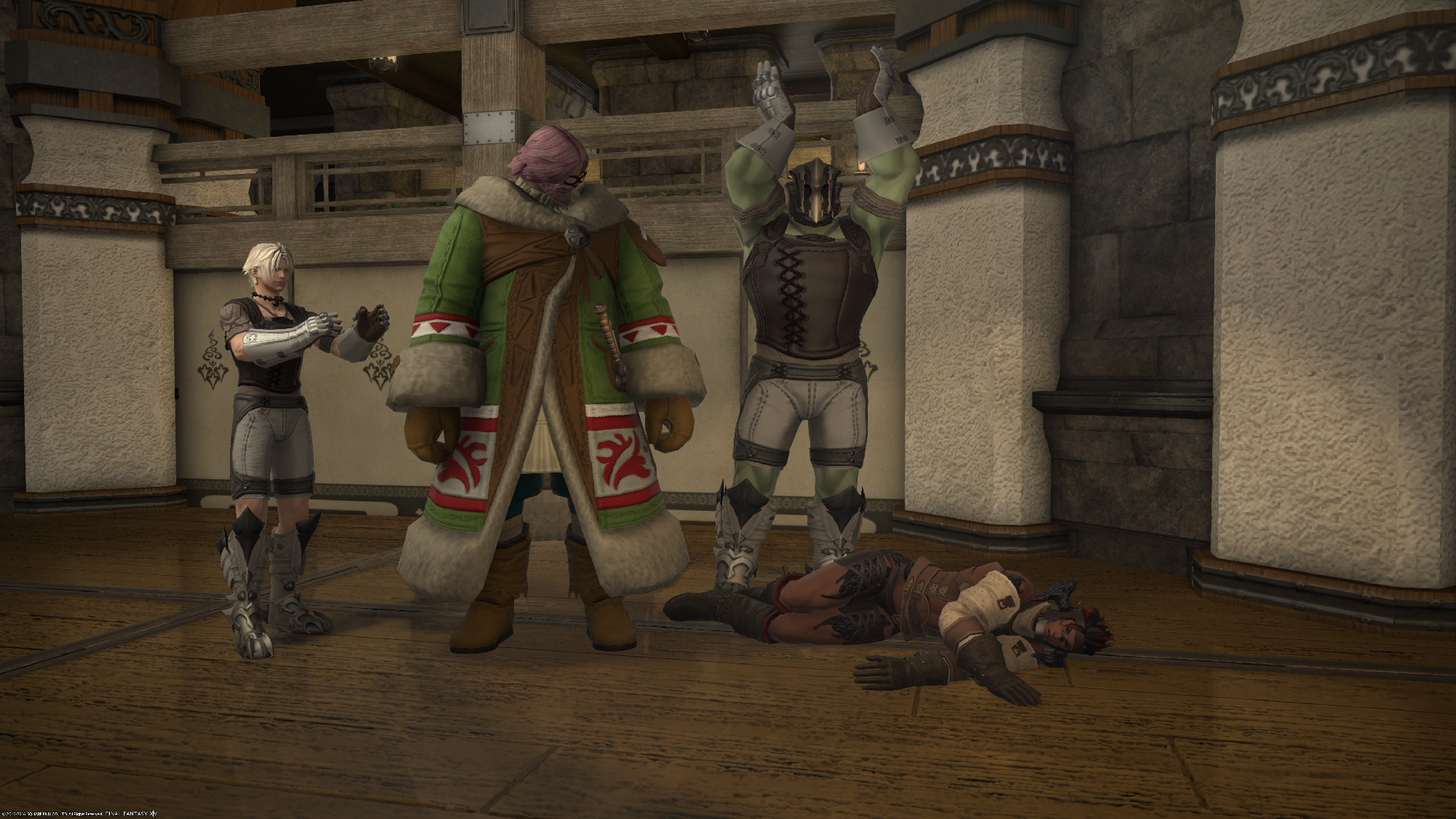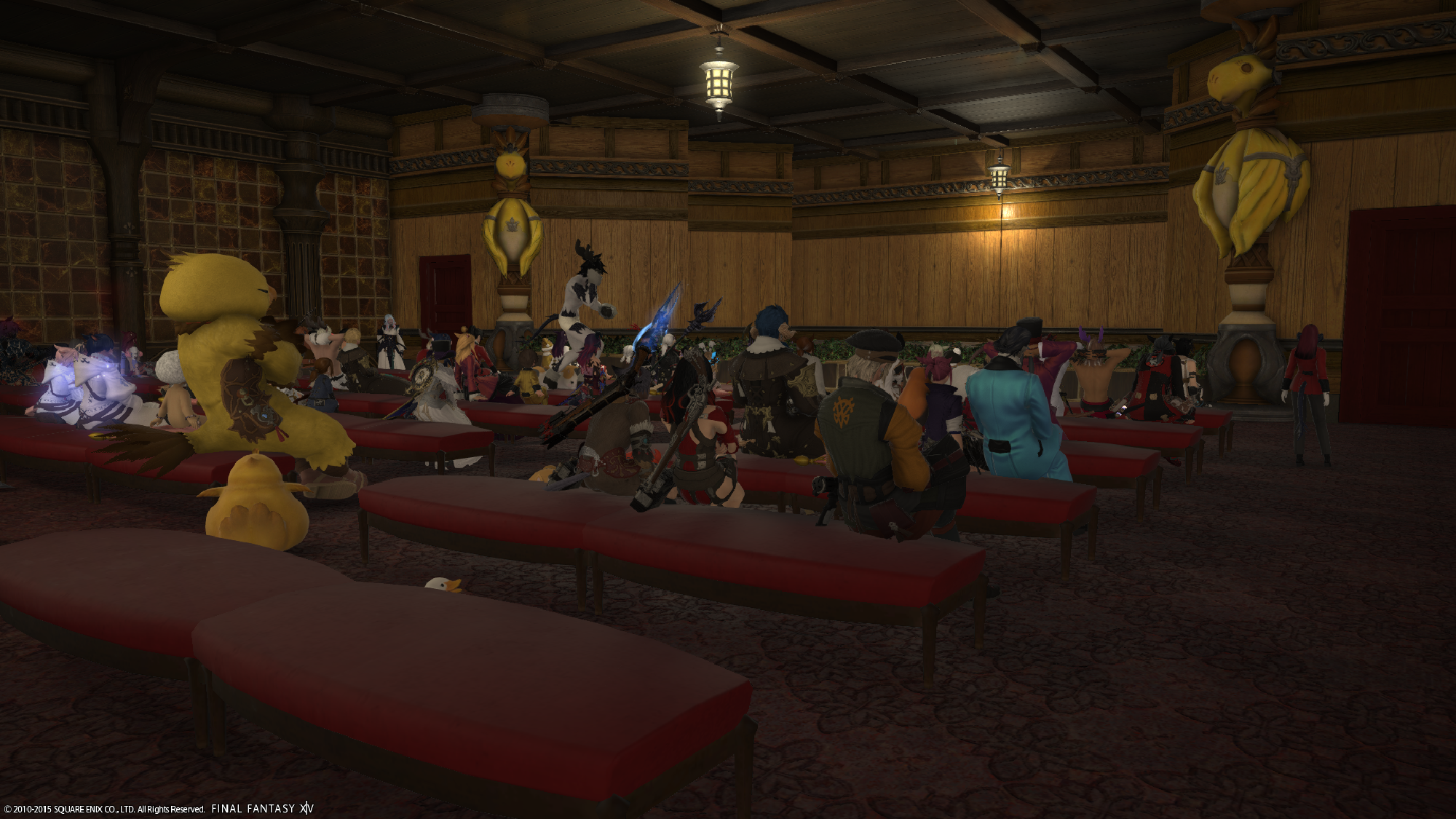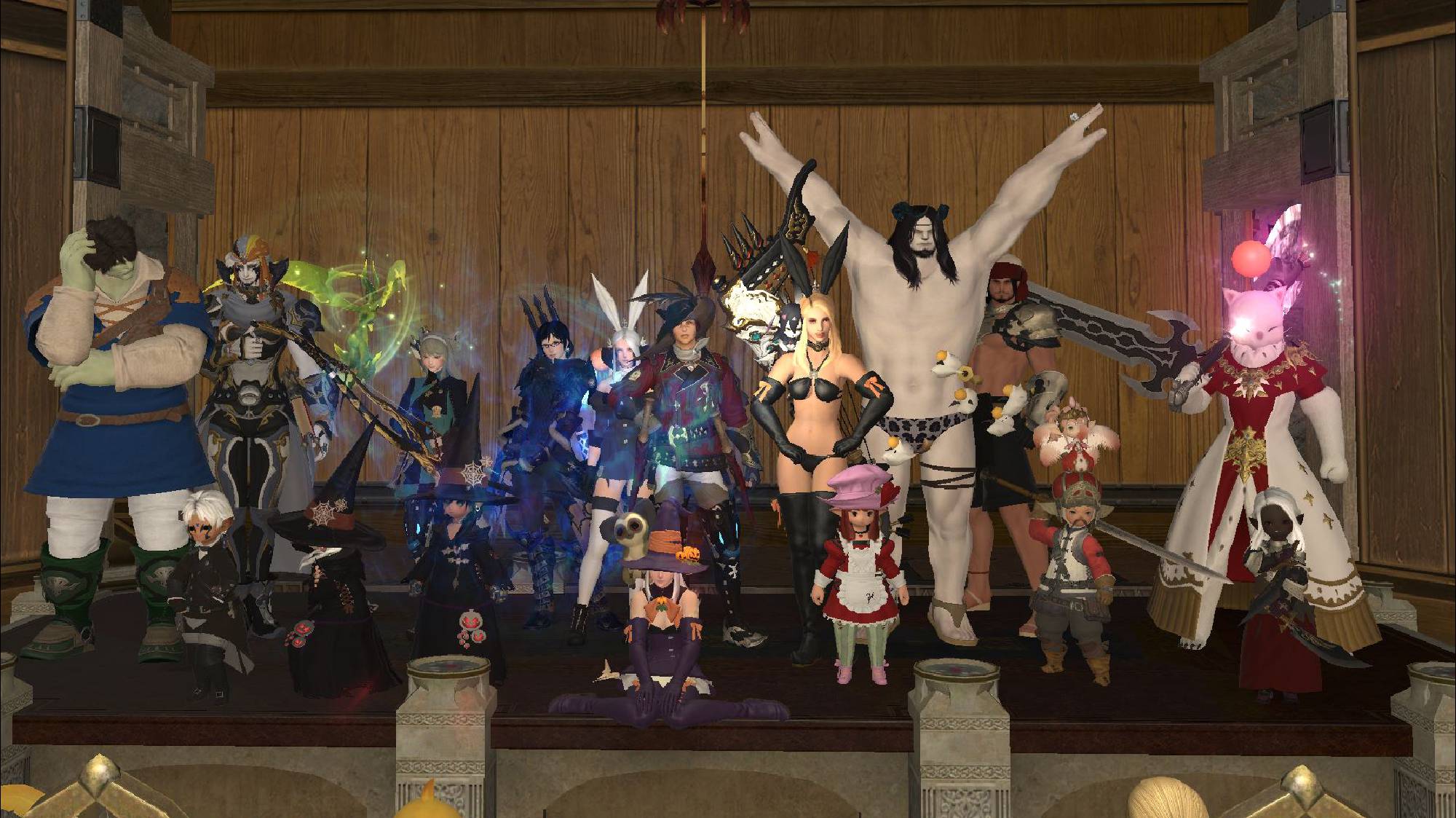I went to a theatrical play inside Final Fantasy 14, and it was enchanting
How a group of playwrights are bringing the magic of theater to MMOs.
When most Final Fantasy 14 players would be grinding away in dungeons, hundreds are travelling from all over Eorzea to watch something I never thought possible in an MMO. At first I was skeptical, but then the lights dim and the music swells to a triumphant fanfare, fireworks explode across the stage amid cheers and applause from the audience. A door opens upstage left and a king wearing a long, regal gown steps forward. "Ladies and gentlemen," he proclaims in text chat, "tonight's performance is a story that takes place long, long ago..." I'm about to witness Final Fantasy 14's very first theatrical production.
A Stage Reborn is a very different kind of guild—at least in the MMO sense. Where most are focused on actually playing Final Fantasy 14, members of this theater troupe have been meeting multiple times a week since March to rehearse. This weekend they take to the stage in their debut performance of "I Want to be Your Canary," a tragic Romeo and Juliet-inspired play from Final Fantasy 9.
Just because it's a video game doesn't mean you can't experience something that mirrors a real-life professionally run event.
"A Stage Reborn is a community organization that's dedicated to promoting the arts through creative gaming," Wanderer Sabaku tells me. In real life, his name is Steve Pederzani, a law student preparing to take his bar exam this summer. But he's also Final Fantasy 14's very first stage director. It was his idea that brought me and nearly a thousand viewers together—the idea that players could perform and engage with the arts inside of an MMO.
"We started this over a year ago under a different name as a small event organization to give players a break from the regular grind, since many often get bored or a bit jaded from in-game content," he says. His project was a hit among the community, and as the following continued to grow, so did Pederzani's ambitions. "We ran a lot of contests, skits, and other events, like a haunted house, but earlier this year we wanted to push more in our mission to engage players with the arts," Pederzani tells me. "We figured the best way to do that would be to do a play. A few of us have professional theater backgrounds and thought it would be a great idea to build sets and run shows with the following we built. The idea was that just because it's a video game doesn't mean you can't experience something that mirrors a real-life professionally run event."
Fast forward nine months, and that idea is taking life on stage before an audience of around 50, while hundreds more are queued up outside and several hundred watch on Twitch. Ushers in red—players who volunteer their time just to help—manage the crowds while, behind the set, stagehands ready the pyrotechnics, lighting, and music that will accompany the show. It might take place in a virtual world, but what A Stage Reborn does is no less real.
Whose macro is it, anyway?
As the king continues his prologue, the music suddenly shifts into an upbeat hoedown and Pederzani smartly shows just how much life the digital theater can have. Two child-like lalafells rush the stage from the audience, followed by a pair of guards shouting after them. What follows is a Scooby Doo-inspired chase scene as doors pop open and the actors weave around the king as he spins about in comic bemusement. Watching videogame theater is more surreal than I ever would have expected.
But despite taking place in a game, the slapstick energy of the scene is palpable. The way the lalafells dash around with their arms waving wildly makes me laugh out loud. All around me the audience is doing the same. The only difference is that their laughter isn't real. It's a chorus of prerecorded giggles and guffaws, each triggered by a player typing commands into their chat window that their characters obey. In the heat of the moment, I almost forget I'm not a part of a real crowd. But those scripted emotes meant to add humanity to the puppets that each player controls also breathe life into the performance. Unlike a normal play, A Stage Reborn's actors don't have to memorize or deliver lines of dialogue, that's all automated for them by Final Fantasy 14's 'macro' system.
The biggest gaming news, reviews and hardware deals
Keep up to date with the most important stories and the best deals, as picked by the PC Gamer team.
For the average player, a macro is a customizable button that lets them chain together several actions at once instead of performing them individually. When fighting a boss, a player might use a macro to stun the beast while also letting the rest of the party know—saving them precious seconds having to type it out themselves. On stage, the actors use macros to trigger lines of dialogue and emotes. "For some roles, they only need a handful of macros," Pederzani tells me. "For others, there's many more. For example, King Leo has 15 different macro buttons set for line and emote combinations, some individual, some combined to work with others' timing."

That timing is the crucial thing that makes the play work. While they don't need to memorize lines, their movement is a tightly choreographed dance—a remarkable feat considering Final Fantasy 14 doesn't have the most precise movement controls. In one scene, the actors recreate a traditional Final Fantasy turn-based battle to excellent effect. As each character lunges forward to strike another actor, both are triggering macros with perfect timing that make the action seem natural instead of stilted and robotic.
While the production might not have to deal with the usual problems that a real-world play would, the technical limitations of Final Fantasy 14 makes the work just as hard. Pederzani tells me that the team faced no shortage of challenges. "While the play itself is not original, we did write an original adaptation, which meant going through [Final Fantasy 9], watching the cutscenes and battles, typing out all the lines, figuring out emotes, movement, blocking, abilities, and spells," he says. "You can't really attack each other in-game so all of that had to be recreated with some experimentation of the game's effects."
Nearly everything you could imagine going into a real life theatrical production goes into a virtual one.
But other problems also became apparent. For one, Final Fantasy 14 has limits on how many players will be displayed on-screen to make the game run smoothly. That's why, despite hundreds arriving to see the show, only 50 could be permitted inside the theater at one time. Any more, and the actors' character models might not appear for those in the audience. "We also had to build the set, test out chat range, camera angles, and run auditions for major roles. Most importantly, we had to set up a schedule when we filled the team since we have players coast-to-coast involved and needed to find times that worked for everybody," Pederzani says. "Nearly everything you could imagine going into a real life theatrical production goes into a virtual one."

The naked audience
All of that effort funnels into a performance that, despite the technical limitations, feels wonderfully authentic. When I sat down with Pederzani after the show, I wanted to know if that feeling extended to the actors as well. If watching it felt real, did acting? "There are times when it feels real," he says, "but there are also times when it feels like I'm still playing a game. I feel it's a good mix of both—you get the feeling and experience of being an actor, but you also get to flex your prowess with the in-game controls."
To illustrate that point, Pederzani tells me that all day he'd been feeling anxious, just like he did before taking the stage in real life. Before the show, the lead actress, Zaynava Kitanni, approached him to see if he had any tips to quell her pre-show jitters. "I thought I'd have no answers for her because I wasn't familiar on anything one could do to help in a videogame," he says. "Then I realized something and told her to try turning all character names off, that way if she panned her camera to the audience, she wouldn't see all the names of the players and wouldn't feel like there was a massive crowd watching. It ended up working out beautifully."
When you can bring the arts into a medium like this, it makes participation so much more accessible to others. It's something truly worth doing.
But the real beauty isn't what's happening on stage, it's what's happening in the audience. Last month I wrote about my misgivings with how goal-obsessed modern MMOs have become as every player is encouraged to pursue personal power even to the detriment of others. But what's amazing is that, even for just 20 minutes, Pederzani and company reminded me that MMOs are about more than acquiring that coveted piece of equipment. They are games where people from all walks of life can gather and socialize in virtual spaces.
A part of me dreaded the moment when someone in the audience would interrupt the show, a troll who would spot an opportunity to disrupt almost a year's worth of effort just because they could. But that moment never came. The magic of A Stage Reborn isn't how Pederzani and company takes the art of theater and transposes it into a videogame, but that in doing so they inspire a sense of community.

"Visual and performing arts bring so much to communities and those within them," Pederzani tells me. "I have had players come up to me or message me after events and tell me that being involved has given them the opportunity to experience something they might never have the chance to experience. This often comes from players that have disabilities, others with extreme social anxieties, even people who have hectic work and family lives that just never have the time to do something artistic in real life. When you can bring the arts into a medium like this, it makes participation so much more accessible to others. It's something truly worth doing."
It might defy the traditions of theater, but that makes the experience even more special.
With over 7 years of experience with in-depth feature reporting, Steven's mission is to chronicle the fascinating ways that games intersect our lives. Whether it's colossal in-game wars in an MMO, or long-haul truckers who turn to games to protect them from the loneliness of the open road, Steven tries to unearth PC gaming's greatest untold stories. His love of PC gaming started extremely early. Without money to spend, he spent an entire day watching the progress bar on a 25mb download of the Heroes of Might and Magic 2 demo that he then played for at least a hundred hours. It was a good demo.


